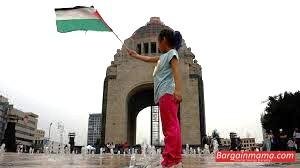As the first anniversary of Hamas’ October 7 attack approaches, global cities are experiencing a wave of demonstrations. Protesters are voicing support for Israelis, Palestinians, or both, with Berlin emerging as a significant center of these activities.
Berlin: A Microcosm of Global Tensions
The German capital has become a hotspot for rival protests, reflecting the broader international divide over the Israel-Palestine conflict. On Saturday, 500 police officers were deployed to manage multiple rallies across the city.

At Humboldt University, demonstrators displayed Israeli flags and images of hostages taken by Hamas last October. The poignant sight of empty chairs adorned with photographs of the missing, labeled “kidnapped” in German, served as a stark reminder of the conflict’s human cost.
Elsewhere in Berlin, around 1,000 pro-Palestinian protesters gathered, waving Palestinian flags and calling for an end to violence in Gaza and Lebanon. Some carried banners accusing Israel of “genocide” in Gaza. Tensions escalated when scuffles broke out between protesters and police, with reports of banned slogans being chanted.
Official Response and Community Reactions
Iris Spranger, Berlin’s Senator for Interior Affairs, condemned acts of hatred and antisemitism, urging protesters to express their views peacefully and respectfully. Despite her call for calm, the protests highlight deep divisions within Berlin and much of Europe.
Josef Schuster, president of the Central Council of Jews in Germany, expressed deep concern over pro-Palestinian demonstrations, describing them as a “low point” for German society. He particularly criticized recent celebrations in Germany following Iran’s rocket attack on Israel, viewing them as a lack of empathy for Jewish people and a threat to Germany’s post-World War II values.
Global Scope of Demonstrations
While Berlin has been a focal point, similar protests have occurred worldwide:
- London: 40,000 people joined the “National March for Palestine,” with clashes leading to at least 15 arrests.
- Rome: Police used tear gas and water cannons to disperse over 6,000 protesters defying a ban on large gatherings.
- Dublin: Demonstrators voiced support for Palestinians and criticized Israeli and U.S. leaders.
- Cape Town: The Palestine Solidarity Campaign organized a march to parliament.
- Other cities: Protests also took place in Paris, Copenhagen, and Basel.
Diverse Perspectives and Calls for Peace
These global protests represent a wide range of viewpoints. While many march in support of Palestinians and against Israel’s military actions, others show solidarity with Israelis, particularly focusing on the suffering caused by Hamas’ attack last year.
Reem Alabali-Radovan, Germany’s commissioner for combating racism, emphasized the need for understanding diverse perspectives. She condemned antisemitism while also urging empathy for those advocating Palestinian rights.
Looking Ahead
As October 7 approaches, cities like Berlin remain vigilant. Authorities, politicians, and community leaders are working to prevent protests from turning violent. However, reconciling the deep divisions within these communities, which mirror the broader geopolitical landscape, remains a significant challenge.
These protests serve as a reminder of the ongoing human cost of the Israeli-Palestinian conflict. Despite differing views on how to achieve it, protesters worldwide share a common hope for peace.



